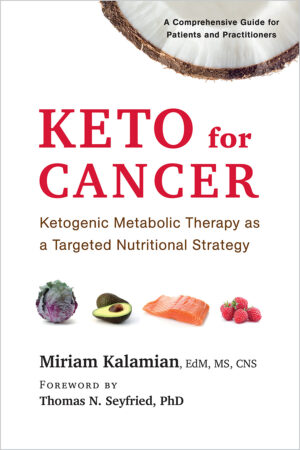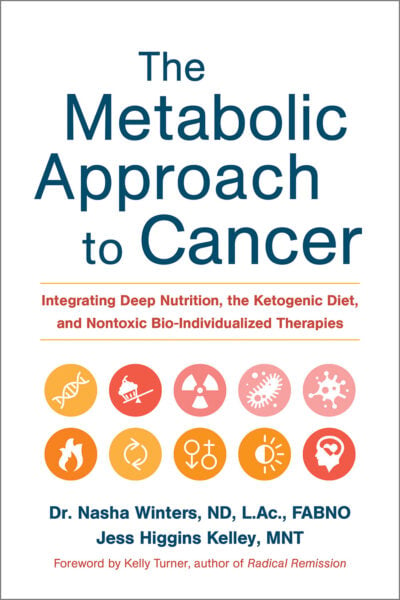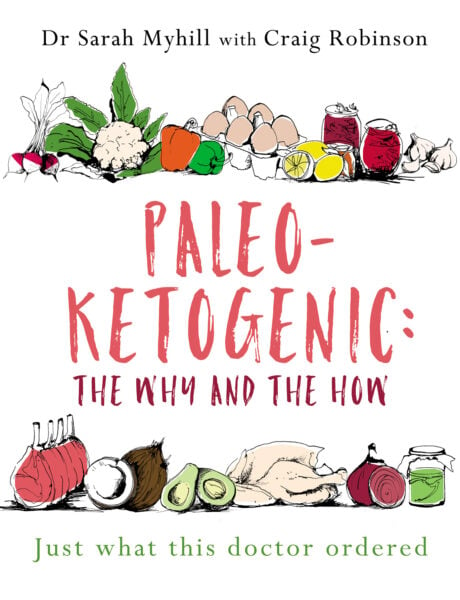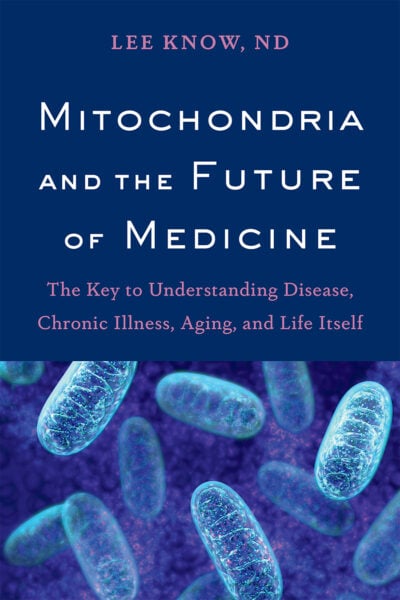The Ketogenic Diet for Cancer: Five Reasons to Consider It

The concept of food as medicine is nothing new. What’s different now is that cancer research has given us a deeper appreciation of the changes that drive cancer at the cellular level. Evidence supporting the benefits of ketogenic diet therapies continues to mount, there is little to guide those who wish to adopt this diet as a metabolic therapy for cancer. Keto for Cancer fills this need.
Inspired by the work of Dr. Thomas N. Seyfried, PhD, nutritionist Miriam Kalamian has written the first book to lay out comprehensive guidelines that specifically address the many challenges associated with cancer, and particularly the deep nutritional overhaul involved with the ketogenic diet.
The excerpt below from, Keto for Cancer: Ketogenic Metabolic Therapy as a Targeted Nutritional Strategy and has been adapted for the web.
First, let me share with you the #1 reason why I personally devoted a decade to sharing what I know about Keto for Cancer.
My beautiful son Raffi was just four years old when we learned that he had brain cancer. Treatment options failed and he was about to be moved to palliative care when I literally stumbled across the early research coming from Dr. Thomas Seyfried’s lab at Boston College. I quickly learned all I could about the diet before deciding to give it a try. After all, what did we have to lose?
At the end of our three month trial, Raffi’s tumour had stopped growing. In fact, it had shrunk back from the tumour margins and was smaller in all dimensions. We continued with the diet, kicking the can down the road for an additional six years. Most of that time, our son enjoyed an amazing quality of life. So when skeptics demand “evidence”, I tell them, “I lived with the evidence”!
Fortunately, the landscape is shifting and now even the most casual search of peer-reviewed and published literature will reveal a stunning number of papers supporting the use of the diet in cancer. I review a lot of this scientific research in my new book Keto for Cancer and share strategies for how to adopt this targeted nutritional therapy.
Let’s flip the demand for evidence on its head and look at the many reasons why you should at least consider a simple trial.
(1) People with cancer don’t have the luxury of time. There is urgency to act as soon as you learn that you have cancer. Your oncologist will want to start treatment right away so it’s in your best interest to learn all that you can, not just about the standard of care for your particular cancer, but also about any add-ons (adjunct therapies), like diet, that might enhance those treatments.
(2) Diet does matter! But that’s not what you’re likely to hear from your oncologist. Honestly, though, would you ask for plumbing advice from a history professor? Of course not! Even though oncologists excel in their field, that doesn’t make them experts— or even knowledgeable—about topics that they haven’t studied. Of course you need to listen to any medical or nutritional objections they may have. Not everyone is a good candidate, as I point out in my book. On a positive note, if your doctor tells you that diet doesn’t matter, then you’ve just been given the green light to eat what you want. Switch to a ketogenic diet? Or eat potato chips. Your choice!
(3) The ketogenic diet inhibits pathways associated with cancer progression. This gets into some heady science! To put it simply, the ketogenic diet mimics fasting, and nutrient sensing at the cellular level inhibits activities that it deems non-essential, including the rapid proliferation characteristic of most cancer cells. This goes far beyond the simple notion of “starving cancer”. In fact, even if you eat zero carbs, your blood sugar remains within what’s called “physiological norms” because your liver takes over the task of producing enough glucose to meet the needs of healthy cells without overfeeding cancer.
(4) Side effects are reversible. There’s too much emphasis given to “keto flu” and other temporary side effects associated with weaning yourself off carbs. These typically ease up as you adapt to the diet. If you decide that you can’t stick with the diet, then you can return to your old eating patterns. No harm done. Not so with drug therapies. Side effects persist or worsen with time, and some, such as chemo and radiation, can continue to exert their adverse effects long after the treatment is over. Please understand that I’m not suggesting that you forgo conventional care. Just put this “side effects” issue into proper perspective: Cancer is a game changer and just about anything you decide to do is going to have a period of discomfort attached to it.
(5) What have you got to lose? Honestly, that’s how we came to initiating the ketogenic diet with our son. The mechanics of the diet are simple. All you’re giving up here are a set of foods that are non-essential, replacing them with healthy fats. But be sure that you have the tools and resources needed to adopt a ketogenic diet that’s optimized for cancer. My book, Keto for Cancer, can help you get through the minefield of misinformation that often leaves people feeling too overwhelmed to start.
Obviously, these five reasons are just the tip of the iceberg when it comes to the body of knowledge that should be considered in deciding whether or not a ketogenic diet is right for you. Do your homework! Only then will you be able to make informed decisions that impact the direction of your healthcare.
Miriam Kalamian is a board-certified nutrition consultant, educator, and author specializing in the implementation of ketogenic therapies. She draws on a decade of experience to provide comprehensive guidelines that specifically address the many diet and lifestyle challenges associated with a cancer diagnosis. Her work also includes integrating nutritional strategies with metabolic therapies and lifestyle modifications to develop personalized treatments that address a broad spectrum of conditions that are currently considered intractable, such as age-related, neurodegenerative, and bariatric diseases. Miriam lives in Montana. Her new book is Keto for Cancer: Ketogenic Metabolic Therapy as a Targeted Nutritional Strategy.
Recent Articles
Many know the effects of catnip on our feline friends, but few realize that catnip has medicinal effects for humans. From stomach aches to reducing fevers, catnip is a versatile herb with many benefits. The next time you grow this plant for your cat you may end up taking a few cuttings for yourself! The…
Read MoreWhether you’re looking to replace your end-of-the-day cocktail, relax before bed, or want something new to add to your tea, this non-alcoholic mocktail syrup base will do the trick. Delicious and all-natural, take a sip of this nightcap mocktail and feel your troubles melt away. The following is an excerpt from Herbal Formularies for Health…
Read MoreSurprisingly, medicine can actually be delicious. This anti-inflammatory smoothie uses natural (and tasty!) ingredients to help reduce inflammation caused by any number of circumstances. The following is an excerpt from Herbal Formularies for Health Professionals, Volume 4 by Jill Stansbury. It has been adapted for the web. RECIPE: Ginger and Pineapple Anti-Inflammatory Smoothie This is an all-purpose…
Read MoreMake your own delicious, healthy, probiotic sauerkraut! Four easy steps are all you need to turn fresh garden veggies into a long-lasting, tangy, pungent condiment. The following excerpt is from The Art of Fermentation by Sandor Ellix Katz. It has been adapted for the web. 4 Simple Steps to Making Sauerkraut The English language does…
Read MoreDo you love Cheez-Its, but not the nutrition facts? Try your hand at this healthier, homemade version. These crunchy, cheesy snacks are not only ridiculously yummy, they’re also very easy to make! The following recipe is from The Heal Your Gut Cookbook by Hilary Boynton and Mary G. Brackett. It has been adapted for the web. RECIPE:…
Read More









